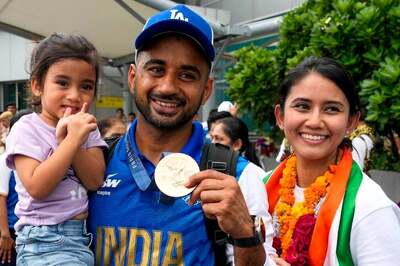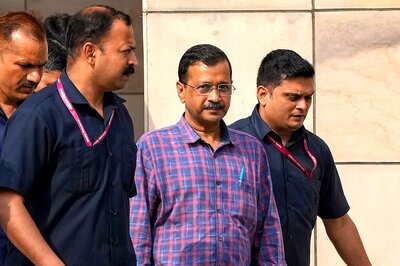
views
Regional parties built around caste constituencies also tend to evolve and perpetuate powerful political dynasties. Regional satraps tend to rely on a close group of confidantes to manage their fiefdoms. Political patronage thus gets vested upon a trusted group which comprises the leader’s immediate or extended family.
Innumerable examples of this nature are spewed across the Indian political landscape. From the Karunanidhi family in Tamil Nadu to TDP in Andhra Pradesh and the Badals and Samajwadi Party up north.
Complications in this power model develop during transition of power from one generation to the other. Power struggles are intense. Intrigue, cloak and dagger, rhetoric - every trick up the sleeve to settle festering leadership issues is employed. And there is no mercy shown, both by the challenger and the challenged.
More than twenty years ago, N Chadrababu Naidu pulled a fast one on his father-in-law and TDP leader NT Rama Rao. The party was being hijacked by Rao’s second wife Lakshmi Parvathi, he alleged. The Telugu matinee star could not bear the loss of leadership to his own son-in-law and passed away after a few months.
The most bitter power struggle in the last one decade was witnessed in the Samajwadi Party in Uttar Pradesh. The challenger was Mulayam Singh Yadav’s brother Shivpal who wanted to settle leadership issues between him and nephew Akhilesh Yadav.
There are some similarities and some stark differences in the way the internal power struggle played out in the SP and the one that is unfolding in the NCP. In fact, it seems Ajit Pawar, in revolting against his uncle, seems to have learnt a lesson or two from the succession war in SP.
Mulayam had sought to settle the leadership issue in SP when the party was in power and Akhilesh was comfortably settled in the CM’s chair with a clear majority. That proved to be the biggest disadvantage for challenger Shivpal.
In Maharashtra, Ajit Pawar decided to strike and seize power for himself and put the uncle on the back foot just when NCP had finalised power sharing arrangement with the Congress and the Shiv Sena.
The decision was fraught with risk but then for the nephew here the choice was between the stick and a hard rock. If the government manages to survive, he will seize of the opportunity to take control of the party. If he loses, he has chosen a powerful ally in the BJP to protect him at the Centre and in the state.
Mulayam’s biggest strength in dealing with his brother in UP was his ability to give an impression of being in support of his brother Shivpal. He kept his son’s challenger close to him, never for once letting him go out of control, guiding and moulding Shivpal’s political moves. And all this while son Akhilesh cemented his position in the party.
There are reports that there were intense efforts within the NCP to bring Ajit Pawar back to the party fold. Sharad Pawar has been making efforts through emissaries to bring back Ajit Pawar. MP Sunil Tatkare and Former Deputy CM Chagan Bhujbal have met the nephew with message from the NCP chief. Thus far Ajit Dada has remained adamant.
He was removed as the leader of the legislature party but his membership of NCP was not scrapped.
It is learnt the nephew told the emissaries that he had reached a point of no return. Once having taken the plunge, Ajit Pawar knew his loyalty in the NCP would always be suspect. And he would also be burning bridges with the new found ally in the BJP if he were to go back now. We will see what happens, he is said to have told Tatkare who is considered close to him in party circles.
In terms of similarities in the power struggle in Lucknow and Mumbai, the ensuing turn of events have ended any imminent political challenge to the immediate family of the leader.
Shivpal is out of SP. So is Ajit Pawar from NCP. As in SP, Shivpal was seeking a larger political role for his son. So was Ajit Pawar for Parth who lost the Lok Sabha polls earlier this year. But having taken the plunge, Ajit Pawar did not prevaricate. He knew indecision and delay would only weaken his position.
Which is why, Ajit Pawar told the Supreme Court on Monday that “I am the Nationalist Congress Party”.
In power struggle and succession war, there are no half measures.


















Comments
0 comment